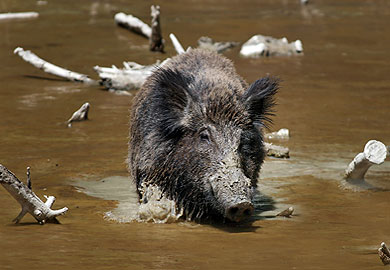To combat the scourge of highly destructive feral pigs, the S.C. Department of Natural Resources (DNR) in conjunction with several partners is sponsoring a Wild Hog Management Workshop on Thursday, Dec. 11 from 9 a.m. to 2 p.m. at the Blue Heron Nature Center in Ridgeland.
Join experts from USDA Animal and Plant Health Inspection Service Wildlife and Clemso n Extension Service Natural Resources Agents to learn about the biology, laws/regulations, and management options for feral hogs. Deadline to apply is Dec. 3. Space is limited to sign up today.
n Extension Service Natural Resources Agents to learn about the biology, laws/regulations, and management options for feral hogs. Deadline to apply is Dec. 3. Space is limited to sign up today.
Registration is $10 and lunch will be provided. Interested participants should send a check with name, address and phone number made to Hampton Conservation District at 1002 Elm Street East, Suite B – Hampton SC 29924. For more information call (803) 943-2586, ext. 101.
Feral pigs have been called by some an “ecological train wreck” and the destructive nature of this invasive species lends itself easily to such a description. All feral pigs share an unbridled appetite and can destroy hundreds of acres of farmland as well as native plants and wildlife habitat in just a few short nights. Free roaming pigs reproduce at a prodigious rate and are capable of producing two litters of up to a dozen piglets a year.
Feral hogs carry diseases such as brucellosis and pseudorabies. Pseudorabies is a viral disease of the central nervous system that can affect domestic hogs, cattle, horses, goats, sheep, dogs and cats, but is not related to the rabies virus and does not cause serious disease in humans. Brucellosis is caused by a bacterium and can infect livestock and humans. It is a significant threat to commercial swine and can cause a range of symptoms in humans that are similar to the flu. Wild pigs also have internal parasites including roundworms, liver flukes and, trichinosis. Trichinosis infections in humans are caused by consumption of undercooked, infected pork.
The workshop is sponsored by Allendale, Beaufort, Hampton and Jasper Soil & Water Conservation Districts, in cooperation with USDA-NRCS.

